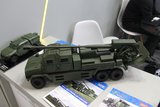Gulf States continue to forge defence industry partnerships, boosting autonomy and economic diversification
US Marines train with Emirati soldiers. (Photo: US DoD)
Nowhere was this trend more apparent than at IDEX during the week of 20 February, where the Edge conglomerate and other Emirati firms inked deals to further localisation of design, development and production.
During the week, Edge signed agreements with Italian shipbuilder Fincantieri, L3Harris and BAE Systems.
Edge's MoU with BAE paves the way for the duo to explore 'potential collaboration and co-creation opportunities to enhance technologies and capabilities across the United Arab Emirates'.
The agreement will see both companies work together in cyber, maritime, air and defence to support the UAE's industrialisation goals and support its plans to become
Already have an account? Log in
Want to keep reading this article?
More from IDEX and NAVDEX 2023 | View all news
-
![IDEX 2023: Autel Robotics showcases DJI challenger drone]()
IDEX 2023: Autel Robotics showcases DJI challenger drone
Autel Robotics presented its Dragonfish series and EVO Max 4T at IDEX 2023, hoping to challenge DJI's market dominance with the latter.
-
IDEX 2023: Lacroix tightens UAE bonds with joint venture agreement
Lacroix forged an agreement for UAE manufacturing at the Emirati show and showcased its latest vehicle self-protection system.
-
![IDEX 2023: Saab showcases new laser warning sensor for vehicle self-protection]()
IDEX 2023: Saab showcases new laser warning sensor for vehicle self-protection
At the Emirati show, Saab showcased a range of vehicle self-protection and countermeasure solutions.
-
![NAVDEX 2023: DSIT to supply ASW kit for undisclosed NATO navy]()
NAVDEX 2023: DSIT to supply ASW kit for undisclosed NATO navy
DSIT, a subsidiary of Rafael Advanced Defence Systems, has been selected by a European shipyard to equip a NATO navy with its anti-submarine warfare solutions.
-
![IDEX 2023: Guardiaris partners with KRMC to bring innovative training to Saudi Arabia]()
IDEX 2023: Guardiaris partners with KRMC to bring innovative training to Saudi Arabia
The partnership between Guardiaris and KRMC aims to provide high quality training solutions to clients in the Middle East and further advance the defence industry in Saudi Arabia.
-
IDEX 2023: Ukraine accelerates shift to Western artillery systems
Details are emerging of new Ukrainian 155mm self-propelled artillery systems and 300mm mobile rocket launcher.

























